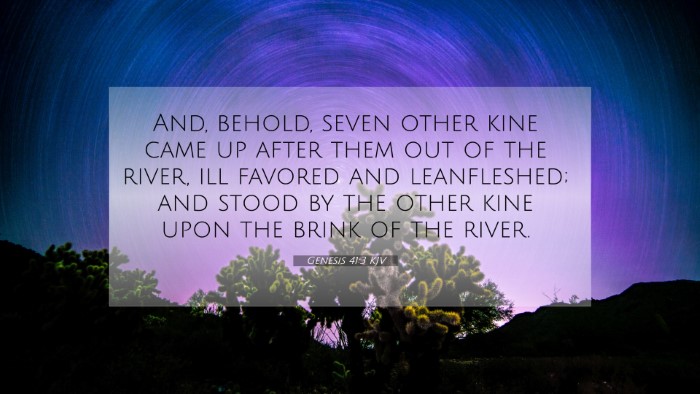Bible Verse Meaning: Genesis 41:3
Verse Reference: Genesis 41:3 - "And, behold, seven other kine came up after them out of the river, ill-favoured and lean-fleshed; and stood by the other kine upon the brink of the river."
Summary of the Context
This verse occurs within the narrative of Pharaoh's dreams, where he sees seven healthy cows being devoured by seven unhealthy ones. This imagery sets the stage for Joseph’s interpretation of the dreams, highlighting themes of prosperity and famine.
Interpretation from Public Domain Commentaries
- Matthew Henry:
Henry notes that the number seven signifies completeness, indicating the full cycle of prosperity followed by a complete cycle of want. The lean cows symbolize the impending years of famine that will devastate the land of Egypt.
- Albert Barnes:
Barnes emphasizes that the "ill-favoured" nature of the second group of cows illustrates the stark contrast between abundance and scarcity. The dream serves as a divine warning and an invitation for preparation during the years of plenty.
- Adam Clarke:
Clarke elaborates on the imagery, indicating that the unhealthy cows “standing by the other” signifies the ominous presence of famine alongside prosperity. He suggests that this duality serves as a reminder of God's sovereignty in controlling the cycles of abundance and need.
Thematic Bible Verse Connections
This verse not only indicates Joseph's prophetic gift but also symbolizes broader Biblical themes such as divine warning and human responsibility. The themes of plenty and scarcity found here connect with various other scriptures.
Related Cross-References
- Genesis 41:29-30: Further explains Joseph's interpretation of Pharaoh's dream and the impending famine.
- Acts 7:9-10: Refers to Joseph's story and his rise to power, emphasizing God's providence.
- Matthew 24:21-22: Jesus speaks of great tribulation, drawing parallels with times of want and need.
- Deuteronomy 28:47-48: Discusses blessings for obedience and curses for disobedience, linking abundance with faithfulness.
- Proverbs 10:3: The Lord does not let the righteous go hungry, emphasizing God’s provision.
- Genesis 37:25: Joseph's brothers' initial act of selling him, setting the stage for his later interpretation of dreams.
- Revelation 6:5-6: A vision of famine in the end times, continuing the cycle of plenty and scarcity.
Understanding the Divine Message
The message within Genesis 41:3 implores readers to recognize the transitional nature of abundance. It indicates that good times should be a time for planning, while difficulty urges reliance on divine provision. The contrasts drawn through this verse echo throughout Scripture, reinforcing the urgency of both preparation and trust in God's plan.
Tools for Bible Cross-Referencing
To delve deeper into the connections of this verse with others, utilizing a Bible concordance can be beneficial. These tools help identify themes and keywords that link various scriptures.
- Bible cross-reference guide: A helpful resource for tracing thematic elements found in multiple verses.
- Cross-reference Bible study: Engaging in studies that utilize cross-references can illuminate deeper meanings.
- How to use Bible cross-references: Familiarizing oneself with cross-referencing methods enhances understanding.
- Bible reference resources: These materials provide expansive insights into scriptural connections.
Interpreting Themes Through Cross-References
Cross-referencing tells a larger story within the Bible. For example, understanding the themes behind Joseph’s dreams assists in understanding God’s redemptive plan throughout history. This narrative not only speaks to core Jewish traditions but also uncovers foundational Christian teachings about the providence and timing of God.
Conclusion
Genesis 41:3 is a powerful illustration of God’s communication through dreams and the importance of discernment in times of plenty. As believers, utilizing the resources and methods for cross-referencing can enhance one's study experience. Engaging with the broader theological themes found throughout scriptures fosters a more profound understanding of faith and divine providence.




